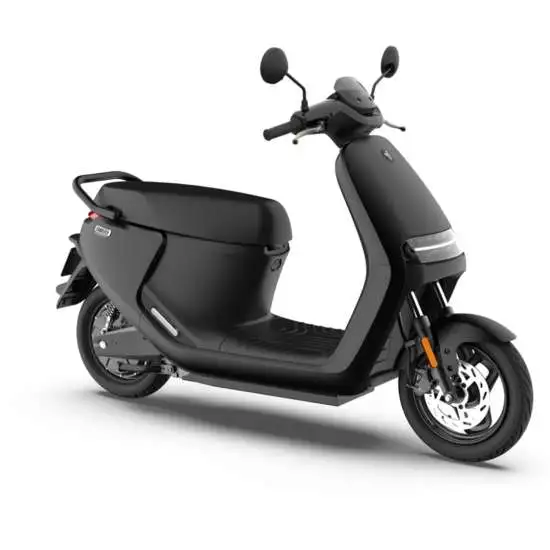Make: Segway
Explore our fleet of available models from this make.

The story of Segway is one of the most fascinating and peculiar in the world of technology and personal transport. The brand became famous for a revolutionary product that, although it did not achieve the expected mass success, changed the perception of personal mobility.
The Segway PT Media Boom
The company was founded by inventor Dean Kamen in 1999, under the name "DEKA Research & Development". The project was kept in the strictest secrecy, generating enormous expectation in the media, which described it as an invention that would "change cities forever". The mysterious vehicle was known internally as "Ginger" or "IT".
In 2001, Kamen finally unveiled the Segway Personal Transporter (PT) to the world. This self-balancing, two-wheeled device, which moved based on the rider's lean, caused an unprecedented media commotion. Its futuristic design and almost magical operation made it an icon of innovation. It was expected to be massively adopted by the public for daily commutes.
From Utopia to Reality
Despite the initial hype, the Segway PT did not become the personal mobility revolution many predicted. Its high price (around $5,000) and regulations limiting its use on pavements and streets relegated it to a niche market. Its main use centred on tourist applications, security patrols, and logistics in large warehouses or airports.
Over the years, Segway changed hands several times. In 2009, it was acquired by the British tycoon Jimi Heselden, who tragically died after falling off a cliff while riding one of the vehicles.
The Ninebot Era and the Renaissance
In 2015, Segway's story took a radical turn when it was acquired by the Chinese start-up Ninebot, which specialised in electric personal mobility vehicles. This acquisition was seen as a "reverse takeover", as Ninebot, a younger company, bought the iconic Segway.
Under Ninebot's direction, the brand's strategy changed completely. The company leveraged the popularity of electric scooters to launch products that were much more affordable and aimed at the general public. Segway-Ninebot's scooters quickly became a global success, dominating the micromobility market and becoming a favourite of scooter hire companies.
Present and Future
Today, Segway-Ninebot is an undisputed leader in the manufacture of electric scooters and unicycles. The brand has diversified its catalogue to include electric bicycles, mopeds and, more recently, high-performance electric motorcycles, such as the Segway E300SE. Thus, Dean Kamen's legacy of innovation continues, but in a more practical, affordable format adapted to the needs of modern mobility.
The Segway PT Media Boom
The company was founded by inventor Dean Kamen in 1999, under the name "DEKA Research & Development". The project was kept in the strictest secrecy, generating enormous expectation in the media, which described it as an invention that would "change cities forever". The mysterious vehicle was known internally as "Ginger" or "IT".
In 2001, Kamen finally unveiled the Segway Personal Transporter (PT) to the world. This self-balancing, two-wheeled device, which moved based on the rider's lean, caused an unprecedented media commotion. Its futuristic design and almost magical operation made it an icon of innovation. It was expected to be massively adopted by the public for daily commutes.
From Utopia to Reality
Despite the initial hype, the Segway PT did not become the personal mobility revolution many predicted. Its high price (around $5,000) and regulations limiting its use on pavements and streets relegated it to a niche market. Its main use centred on tourist applications, security patrols, and logistics in large warehouses or airports.
Over the years, Segway changed hands several times. In 2009, it was acquired by the British tycoon Jimi Heselden, who tragically died after falling off a cliff while riding one of the vehicles.
The Ninebot Era and the Renaissance
In 2015, Segway's story took a radical turn when it was acquired by the Chinese start-up Ninebot, which specialised in electric personal mobility vehicles. This acquisition was seen as a "reverse takeover", as Ninebot, a younger company, bought the iconic Segway.
Under Ninebot's direction, the brand's strategy changed completely. The company leveraged the popularity of electric scooters to launch products that were much more affordable and aimed at the general public. Segway-Ninebot's scooters quickly became a global success, dominating the micromobility market and becoming a favourite of scooter hire companies.
Present and Future
Today, Segway-Ninebot is an undisputed leader in the manufacture of electric scooters and unicycles. The brand has diversified its catalogue to include electric bicycles, mopeds and, more recently, high-performance electric motorcycles, such as the Segway E300SE. Thus, Dean Kamen's legacy of innovation continues, but in a more practical, affordable format adapted to the needs of modern mobility.

